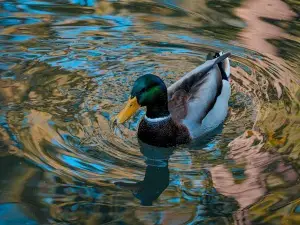
Keeping a very close eye on your ducks is recommended, doing this will help you see if the bird’s health is in check or if the bird’s health is going downhill.
A duck dying will generally show a set of symptoms, if you want to know what those symptoms are then this is the article for you.
Table of Contents
How do I know if my duck is dying?
No one wants to watch their duck die right in front of their eyes but this can happen and does happen.
If you know how to tell that your duck is dying then you may be able to save the bird before it dies. Here are signs to look out for that would indicate that the bird is dying:
Sudden isolation:
Ducks are very social animals, these birds get along with each other quite well and run around with each other all day.
If one of your ducks is suddenly sitting alone somewhere, while the other birds are running around, this is a sign that there is something wrong with the bird.
If your bird has never been inactive in this way you should be concerned and look into what is wrong with the bird
Loss of appetite:
A common symptom of many illnesses, or a duck being close to death, is a loss of appetite. When animals, ducks included, get sick they lose their appetite, their bodies do this as a way of conserving energy.
Digestion takes up a lot of energy, when ducks are sick they need to direct a lot of energy toward recovery, because of this, digestion becomes less important.
The bird’s body releases chemicals that make the bird lose its appetite, this ensures that the bird’s body doesn’t need to use energy to digest food but rather uses this energy towards healing the bird.
A change in droppings:
All poop stinks, this includes duck poop, stinky duck poop shouldn’t worry you. However, if you see a change in your bird’s poop then you should be worried.
Normal duck poop is a solid brown or grayish color and has white patches on it. It smells worse than chicken poop but does not smell as bad as pig poop.
If your duck’s poop starts to look different than the norm this is a sign that there is something wrong with the bird. Sudden green diarrhea coming from your bird is a bad sign.
Unresponsive:
Ducks see humans as predators, a healthy and normal duck will back away from a person who gets too close to it, especially if this person is unknown to the duck and especially if the duck is scared of the person.
If your normally responsive duck suddenly becomes unresponsive, then there may be something wrong with the bird. An unresponsive duck will stay put when you get close to it and may not even be able to lift its head up.
No signs:
Unfortunately, some ducks will simply die unexpectedly after showing no signs that they may die sometime soon.
Some sick birds will express symptoms of being sick but other birds, who have the same sickness, will be asymptotic and will thus not show any signs of being sick.
The only way that you’d know that there was something wrong with an asymptotic bird is when the bird dies.
What to do:
If your bird is showing any of the above signs then you’d need to take the bird to the vet as soon as possible.
Ducks try to hide signs of being ill, this habit kept them safe in the wild. Predators in the wild target sick animals, so sick birds would mask their sickness to keep predators at bay.
Knowing this, if your duck is showing signs of being ill this usually means that the illness is quite far along You’d need to get the bird to the vet as soon as you can.
The vet will be able to quickly diagnose your bird and offer the appropriate treatment for the bird’s ailment.
It is recommended that you conduct routine health exams on your bird so you know how well or badly your bird is doing health-wise. You can conduct health exams every six to eight weeks.
In addition to these routine exams, you would need to observe the birds on a daily basis to check for any changes in behavior or appearance.
If you enjoyed this article then you may also be interested in other chicken related articles. Here are some articles that you may be interested in: Wild Duck Limping, Duckling Curled feet, Hens Picking On Rooster, Duck Lethargic Not Eating, Duck Not Eating,

